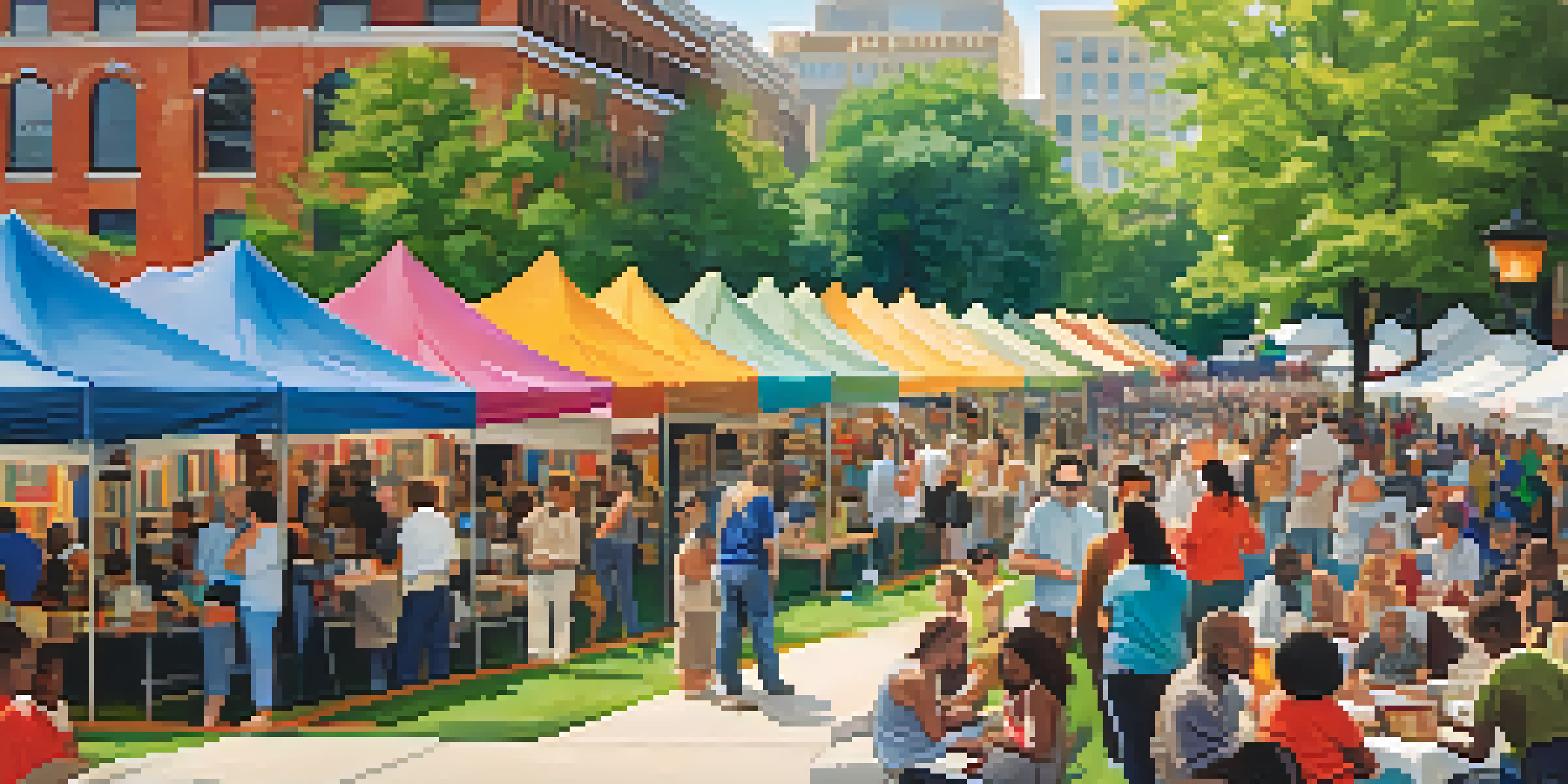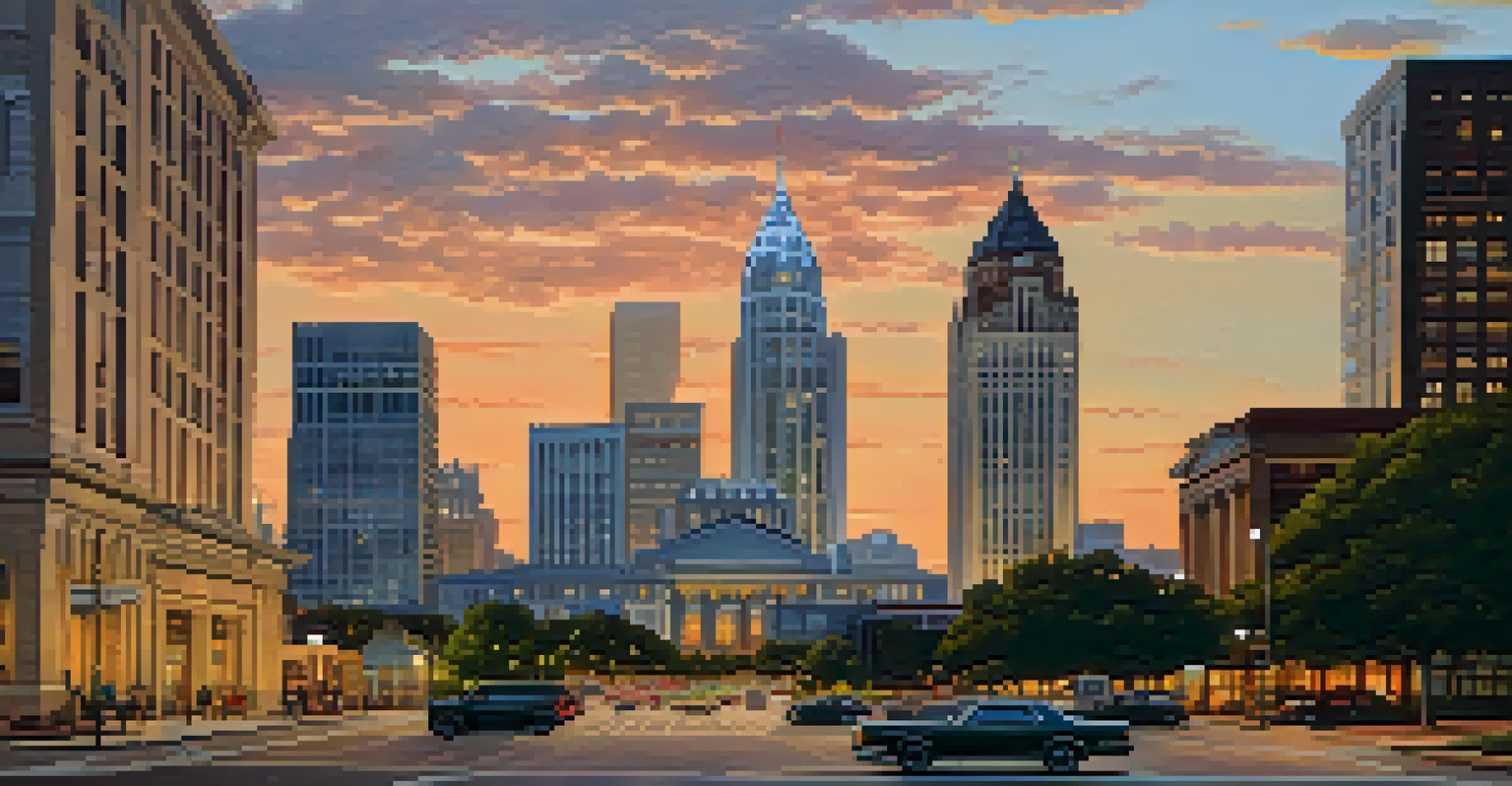Atlanta's Role in Shaping the Southern Literary Tradition

The Birth of Southern Literature in Atlanta
Atlanta has long been a pivotal city in shaping the Southern literary tradition. From the post-Civil War era, it emerged as a cultural hub, attracting writers and thinkers who sought to redefine the Southern identity. This transformation was essential in laying the groundwork for a distinct Southern voice in literature.
Literature is a way of writing oneself into existence.
The city's growth was fueled by the establishment of institutions such as Emory University and the Atlanta University Center, which encouraged literary exploration. Writers like Margaret Mitchell and Alice Walker found inspiration in Atlanta’s rich history and diverse communities. Their works often reflect the complexities of Southern life, showcasing both its beauty and its struggles.
As the literary scene flourished, Atlanta became a meeting place for authors, fostering collaboration and innovation. This vibrant environment not only produced celebrated authors but also set the stage for future generations to explore Southern themes. Thus, Atlanta's role in the birth of Southern literature cannot be overstated.
Key Literary Figures from Atlanta
Atlanta has been home to numerous influential writers whose works have left an indelible mark on Southern literature. Notably, Margaret Mitchell’s 'Gone with the Wind' offers a glimpse into the antebellum South, while capturing the tumultuous changes of the Civil War. Her portrayal of Atlanta during this era has made the city a focal point in literary discussions.

Another significant figure is Alice Walker, whose novel 'The Color Purple' explores themes of race, gender, and resilience within the African American community. Walker's work is deeply rooted in her experiences growing up in Georgia, and it reflects the broader Southern narrative of struggle and triumph. These authors have shaped perceptions of the South through their unique lenses.
Atlanta's Role in Southern Literature
Atlanta has been a cultural hub that significantly shaped the Southern literary tradition through its diverse literary voices and institutions.
Additionally, contemporary writers like Natasha Trethewey continue to build on this legacy, exploring themes of identity and history. Trethewey's poetry often weaves together personal and collective experiences, further enriching the Southern literary tradition. Atlanta’s literary contributions are a testament to its diverse and evolving cultural landscape.
The Role of Atlanta's Educational Institutions
Atlanta's educational institutions have played a crucial role in nurturing literary talent. Schools such as Emory University and Spelman College have produced generations of writers, offering programs that emphasize creative writing and literary studies. These programs not only hone the skills of aspiring authors but also encourage them to engage with Southern culture and history.
Words are things. They get on your walls. They get in your wallpaper. They get in your rugs. In your upholstery. And your clothes. And finally, into you.
The city's literary festivals and workshops also provide platforms for emerging writers to showcase their work and connect with established authors. Events like the AJC Decatur Book Festival celebrate literature and foster a sense of community among writers and readers. This supportive environment is essential for the growth of the Southern literary tradition.
Moreover, these institutions often host guest lectures and readings, exposing students to a variety of literary voices. By prioritizing diverse narratives, they ensure that the Southern literary landscape remains vibrant and inclusive. This commitment to education and community engagement continues to shape Atlanta's literary identity.
Atlanta's Literary Festivals and Events
Literary festivals in Atlanta serve as a celebration of the city's rich literary culture and its impact on the Southern tradition. Events like the AJC Decatur Book Festival bring together authors, readers, and literary enthusiasts for discussions, readings, and workshops. This vibrant atmosphere not only highlights local talent but also attracts national figures, creating a melting pot of ideas and creativity.
These festivals often focus on themes relevant to the Southern experience, offering insights into race, history, and identity. This connection to local culture allows attendees to engage with the literature on a deeper level, fostering a sense of community and shared experience. The exchange of ideas during these events strengthens the bonds within the literary community.
Influential Writers from Atlanta
Notable authors like Margaret Mitchell and Alice Walker have crafted works that reflect the complexities of Southern life, influencing perceptions of the region.
Furthermore, these gatherings promote the importance of storytelling as a means of understanding and processing the complexities of Southern life. They remind us that literature is not just about entertainment; it’s a lens through which we can examine our past and envision our future. Atlanta's literary festivals are vital for preserving and evolving the Southern literary tradition.
The Impact of the Civil Rights Movement on Literature
The Civil Rights Movement significantly influenced Atlanta's literary landscape, prompting writers to address issues of race and social justice. Many authors used their platforms to advocate for change, weaving these themes into their narratives. This period marked a turning point, as literature became a powerful tool for activism and reflection.
Atlanta, being a central location for the movement, was home to numerous writers who documented the struggles and triumphs of the era. Authors like James Baldwin and Maya Angelou captured the essence of the fight for equality, providing poignant insights into the African American experience. Their works resonate deeply within the Southern literary tradition, as they explore the intersection of race, identity, and resilience.
As a result, the literature emerging from this time not only reflects the societal changes but also continues to inspire new generations to engage with these important themes. The legacy of the Civil Rights Movement is a crucial part of Atlanta's literary identity, reminding us of the power of words in the face of adversity.
The Influence of Atlanta's Urban Landscape
Atlanta’s urban landscape has inspired countless writers, shaping the way they depict Southern life. The city’s juxtaposition of modernity and history provides a rich backdrop for storytelling. Writers often draw upon the city's diverse neighborhoods, each with its unique character, to illustrate broader themes of belonging and identity.
For instance, the contrasts between affluent areas and historically marginalized communities create a tapestry that reflects the complexities of Southern culture. This duality allows writers to explore themes of struggle and resilience, making Atlanta a microcosm of the Southern experience. By focusing on their surroundings, authors can delve into deeper societal issues.
Impact of Civil Rights on Literature
The Civil Rights Movement inspired Atlanta's writers to address race and social justice, marking a pivotal shift in the themes explored within Southern literature.
Moreover, the evolving nature of Atlanta—its rapid growth and cultural shifts—inspires discussions about change and adaptation. As the city continues to transform, so too does its literary output, capturing the essence of contemporary Southern life. The urban landscape serves as both a muse and a canvas, enriching the Southern literary tradition.
Atlanta's Future in Southern Literature
As we look to the future, Atlanta's role in shaping Southern literature is poised to continue evolving. The city’s diverse population and cultural richness will undoubtedly inspire new voices and narratives. Emerging authors are already beginning to explore themes that reflect the complexities of modern Southern life, ensuring that the literary tradition remains dynamic.
Furthermore, initiatives aimed at promoting literacy and supporting local writers are crucial for nurturing the next generation of storytellers. Organizations and community programs are stepping up to provide resources and platforms for aspiring authors. This investment in the literary community will help sustain Atlanta's literary legacy.

In conclusion, Atlanta's vibrant literary scene, rooted in its history and influenced by its future, will continue to shape the Southern literary tradition for years to come. As new voices emerge and stories unfold, the city will remain a vital part of the narrative of Southern literature. The journey of Atlanta's literary evolution is one that promises to captivate and inspire.